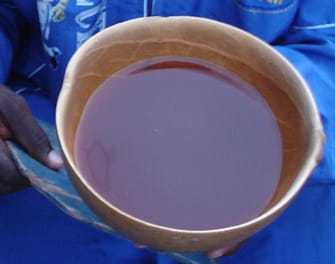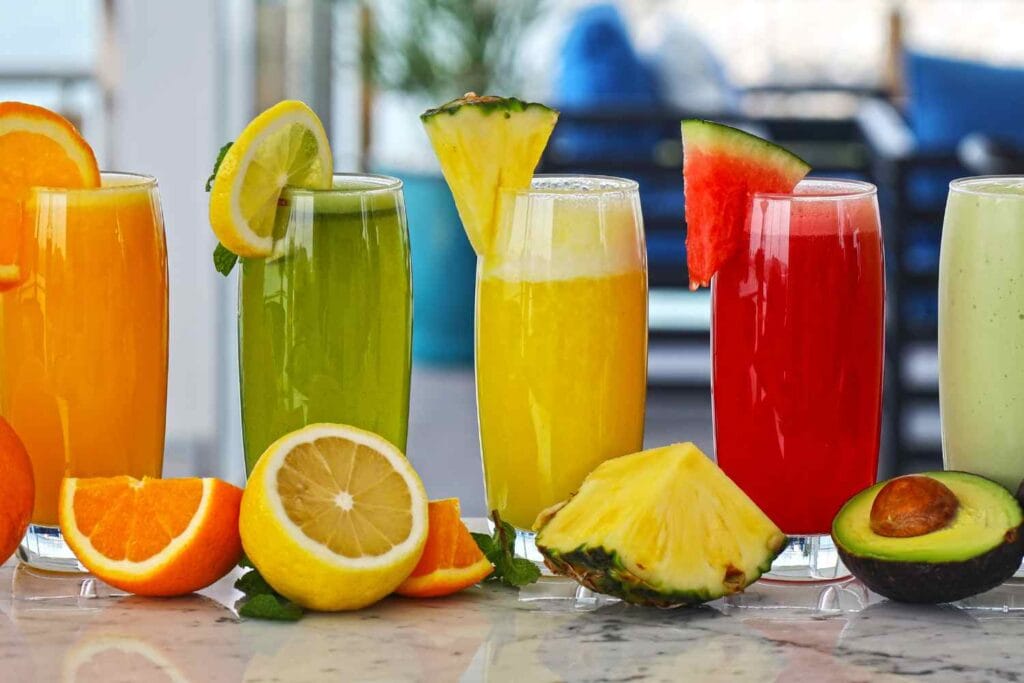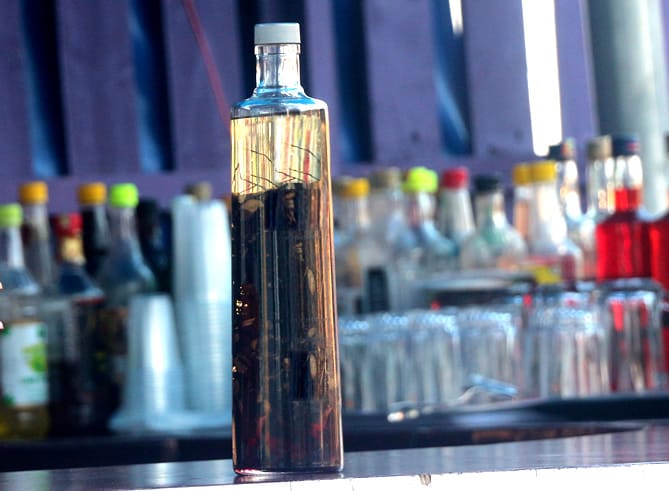A visit to Ghana is never complete without experiencing its traditional drinks. Many people might focus on the rich food culture, but trying some traditional Ghanaian drinks can make your experience much more worthwhile. Imagine enjoying a hearty meal of jollof rice or fufu with a glass of palm wine or bissap. The flavours complement each other perfectly, enhancing the overall enjoyment of your meal.
Ghana’s traditional drinks are very important to its culture and everyday life. From farmers to market women, everyone will find a need to quench their thirst with these bold and rich potions.
Whether you go for the earthy flavour of pito (millet beer) or the sweet, refreshing taste of sobolo (hibiscus drink), each flavour carries its own unique story. They connect people across generations and help to preserve Ghana’s rich cultural traditions. Let’s look at some of these amazing beverages.
1. Palm Wine (Nsafufuo)

A staple of traditional Ghanaian drinks, palm wine is a must-try. Tapped from the sap of palm trees, this beverage offers a slightly sweet and fermented taste. Palm wine, also known as Nsafufuo, is commonly served during social gatherings and celebrations, making it a symbol of Ghanaian hospitality. Whether it’s fresh or fermented, palm wine brings a sense of connection and joy to every occasion.
If you want to experience the real taste of traditional Ghanaian drinks, make sure to try this one. It’s smooth, earthy, and truly unique to Ghana’s drinking culture.
2. Bissap (Hibiscus Drink)

Another of the popular traditional Ghanaian drinks is bissap, a tangy beverage made from the petals of hibiscus flowers. There is a similar drink in Jamaica called sorrel, made with a different variety of the hibiscus plant but having the same red rich colour. It’s refreshing, vibrant, and often sweetened with sugar or flavored with mint and ginger. This drink, known locally as sobolo, is common throughout the country and is perfect for hot days.
The bold flavors of bissap make it a fan favorite among locals and visitors alike. It’s one of those traditional Ghanaian drinks that you’ll find on every street corner, waiting to offer a cool refreshment.
3. Pito (Millet Beer)

For something more unique, try pito, a traditional Ghanaian drink made from millet or sorghum. This homemade, fermented beer has a slightly sour, fizzy taste that grows on you the more you try it. Often served in large calabashes, pito is more than just a drink—it’s a social experience that’s enjoyed in groups.
While pito is an acquired taste for some, it’s undeniably one of the most authentic traditional Ghanaian drinks, and its earthy flavor ties it deeply to the country’s traditions and history.
Related: Unpopular Ghanaian Dishes: Hidden Gems You Might Not Know
4. Tropical Fruit Juices

Ghana is blessed with an abundance of tropical fruits, and these fruits play a key role in some of the best traditional Ghanaian drinks. Freshly squeezed juices made from pineapple, mango, and guava are a perfect way to enjoy the country’s bounty. These juices are often served chilled, making them the ultimate refreshing drink, especially on a hot day.
If you want to experience something fresh and natural, don’t miss out on these fruit-based traditional Ghanaian drinks. They’ll provide you with the flavors of Ghana in their purest form.
5. Atayoh (Ginger Drink)

If you’re looking for a drink with a spicy kick, Atayoh is an invigorating option. Made with ginger, sugar, and sometimes lime or cloves, this drink is known for its bold flavor. Atayoh is perfect as a pick-me-up, offering a refreshing zing that will keep you energized.
As one of the spicier traditional Ghanaian drinks, Atayoh offers not just bold flavor but also a bit of a health boost. It’s a great option for those who love a little heat in their drinks.
6. Atadwe Milk: The Smooth Power Drink

No meal is complete without a thirst-quenching, appetite-pleasing beverage. The beautiful thing about Ghana is that it offers a variety of them. This means that as you delve into the flavors of Ghana, you’ll also be met with potions of love and life.
One of the most slept-on drinks in Ghana is Atadwe milk—though it certainly has its own story. This savory, milk-based drink is made from tiger nuts (atadwe), blended into a creamy beverage with hints of coconut, dates, and spices. It reminds me of a Jamaican punch, made by blending peanuts, milk and spices.
While it’s often considered a health drink, it could easily rival any smoothie on the market. Surprisingly, you won’t find it in most restaurants, which makes it one of those traditional Ghanaian drinks that really should go mainstream.
7. Akpeteshie (Ghanaian Spirit)

For those who enjoy stronger spirits, Akpeteshie is Ghana’s traditional distilled liquor. Made from fermented palm fruit or sugarcane, this potent drink is often enjoyed in social settings. Whether mixed into cocktails or drunk straight, Akpeteshie is an iconic part of the traditional Ghanaian drinks repertoire.
It’s a drink with a strong, bold character—perfect for those who enjoy spirits that carry a bit of history and a lot of flavor.
Conclusion: Bold Flavours So Rich with Love
The world of traditional Ghanaian drinks offers something for every palate. Whether you’re sipping on the sweet, fermented goodness of palm wine, enjoying the tangy burst of bissap, or indulging in a spicy Atayoh, you’ll find that each drink is infused with love, culture, and history. These drinks are not just about flavor—they’re about community, tradition, and the spirit of Ghana.
So, when you visit Ghana, make sure you experience these bold traditional Ghanaian drinks. They’re a true taste of the country’s heart, and once you try them, you’ll never forget the rich flavors that define Ghanaian hospitality.











